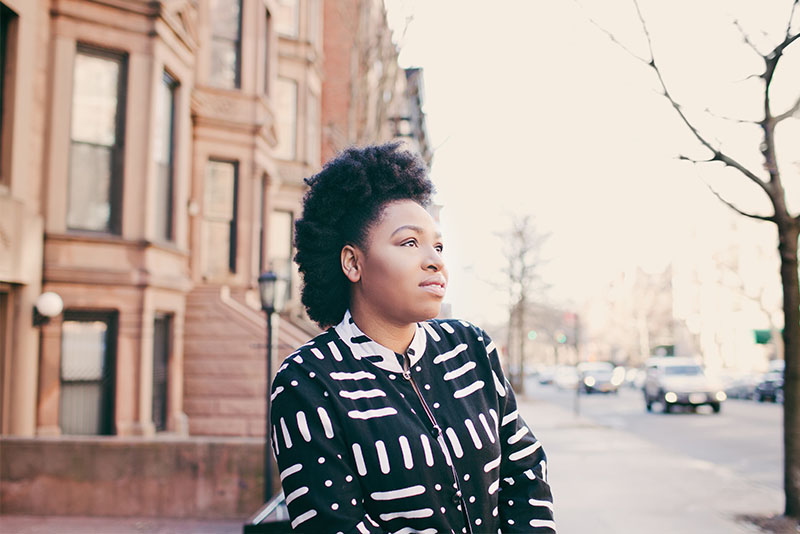Charenée Wade is an acclaimed jazz vocalist, arranger and educator from New York, whose terrific 2015 album Offering pays tribute to the work of renowned poet and artist Gil Scott-Heron and his frequent collaborator Brian Jackson. Wade made a name for herself by coming runner-up to Cecilé McLorin Salvant in the 2010 Thelonious Monk competition, demonstrating a vocal capability that made her the perfect candidate to deliver Scott-Heron’s music from the female perspective. Introduced to her by Mark Ruffin, the project saw her arranging and performing a variety of Scott-Heron material, compiling a work which the Guardian described as “a triumph of emotional empathy, intelligence and assured technique.”
Wade brings the project to Band on the Wall next week, so we caught up with her to delve deeper into the music, her arrangements and some of her other musical projects.
When did you first discover a love for Gil Scott-Heron and how did that develop into Offering?
I first discovered Gil Scott-Heron’s words the way I suspect many people have come to know him: “The Revolution Will Not Be Telelvised”. This project, however, was brought to me by Mark Ruffin. Ruffin had previously released a project with a male vocalist, but was now interested in how it would sound with the voice of female vocalist, a woman’s perspective. When Mark asked me, I revisited Gil Scott-Heron’s library of music. About a year later, we were in the studio recording Offering.
Yourself and the musicians involved in the project place great importance on the cultural relevance of Gil Scott-Heron’s music and the messages that have endured to this day. Can you think of particular instances where you feel his songs still resonate, in relation to society today?
Unfortunately, his songs definitely still resonate, especially in respects to needing to have more compassion for others and standing up and speaking out against injustice. Between abuse of power, racism, police brutality, and discrimination, we have a lot more work to do. And we must continue the work of the Civil Rights Movement to bring equality and peace.
How did you arrange the songs for the project? Did you need to sit down and study the music on paper or were ideas presenting themselves as you listened?
I lived with the music the for almost a year. I found that certain tunes stayed with me throughout the day, week, and months. With those songs, I would sit at the piano and allow the arrangement to come to me, no matter how big or small the idea. Sometimes, I would hear the entire arrangement in one sitting. Other times I would have to develop a concept. All were a response to the lyrics and creating a sound around it that supported the message in a new way. It was really important to me to maintain the integrity of the original composition while maintaining my own voice as an arranger.
How does this music translate to the stage; are the musicians accompanying you in the UK the same ones who worked with you in the studio?
Although the artists in the touring band is different from those in the band on the record, they bring an energy and a power to music that is definitely comparable to the recording. The audience is also a part of music as well, which makes each live performance unique and exciting experience. I am really looking forward to what we will create each night.
Brian Jackson is perhaps lesser praised that Scott-Heron, but played a key part in the creation of a lot of his music. Where do you think his contribution is most telling in their collaborative work?
I would imagine his contribution would be in the soulful grooves and powerful melodies that were created, and much more. It would be nice to talk to Brian Jackson about this.
You have performed live with Terri Lyne Carrington’s Mosaic Project recently, an all female jazz ensemble that celebrates female artists. What was it like working with such a project and as a mentor as well as a performer, do you feel there is a need for more projects like it, to help female musicians pursue routes into music?
Performing live with Terri Lyne Carrington’s Mosaic Project has been an inspiring, humbling and empowering experience. I have admired her work for a very long time, and the artists that she has brought into the band have been an inspiration to work with as well. There are many talented women in jazz (composers, arrangers, performers, educators) who could definitely use more support. Having more projects like this will create more visibility in respects to their artistry and recognition of their contributions to jazz that will then inspire the next generation.
What are your plans for the future, beyond this project?
I have a few projects that I am excited about in the works. I may introduce a few pieces on this tour, so stay tuned.
Pick up tickets for Charenée Wade & The Gil-Scott Heron Project + Pareidolia.



